Revising is one of the most challenging parts of the writing process. When students hear they have to or need to revise the moaning and groaning begin. It feels like more “work” for them and they are right. Revising is hard work and it is not fun. Some students become resistant and even shut down during this stage of the writing process. This is because some students don’t know how to revise, what to revise, or even how to go about revising. Revising in itself is a tedious, lengthy process, and it can be intimidating. Most writers, at any age or grade level, dread going back to the drawing board to rethink and redo. Sometimes writing can be such a daunting task that the goal is to just get it over with and finished as soon as possible. But in my experience with becoming a better writer myself and transforming my students into budding writers, it’s all about coaching students through the revision process and giving them the right tools to help them develop into writers.
Develop The Writer
Revising conferences are the perfect opportunity to have meaningful conversations with students about their writing. Unlike planning, drafting, and editing conferences, revising conferences focus on improving the writing and making it better. Most of the writing is in place, already thought out, and organized but here is where the writer has the opportunity to get feedback to improve the writing. The role of the teacher is to listen, hear concerns, and answer questions. I like to start off revising conferences by asking students what they like about their writing and what they think they did well. This encourages self-reflection and builds confidence. Then we delve into one, yes only one thing, to focus on that needs improving. Sometimes the student is able to pinpoint a part of their writing they need help with or would like to improve. Other times the teacher might suggest a part of the writing that needs some improvement and offers ideas, techniques, or strategies that were previously taught. We want students to revise their writing feeling encouraged, confident, and ready to try new ideas to make their writing better.
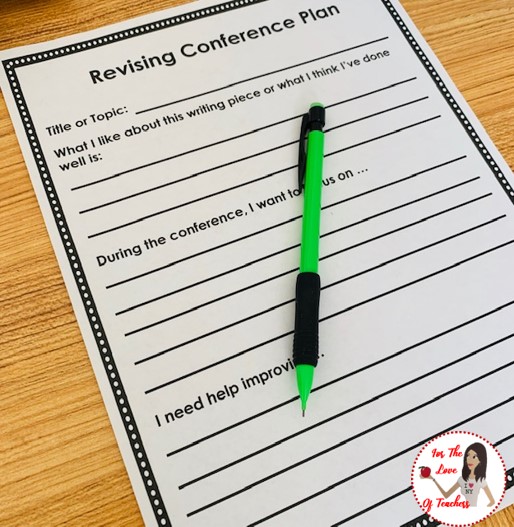
I require students to come to our revising conference with this plan. It helps them prepare for our upcoming conference and is good to have on hand along with conference notes and each student’s writing portfolio. You can get this Revising Conference Plan, along with other freebies in my FREE Resource Library here.
A Simple Revising Equation
Many teachers use the ARMS acronym – ADD, Remove, Move, and Substitute but I prefer Ralph Fletcher’s clever, yet simple, equation for revising:
This equation makes it easy for students to think about adding or expanding something, like a description to help readers visualize or more information to explain a nonfiction piece better. Perhaps take something out like a part that doesn’t move the story along or a character that doesn’t add anything to the piece. Maybe change something, like a part, lead, or genre, and divide the writing into paragraphs or chapters. This equation has been such a game-changer to help students get through the writing process with ease and give them a clear focus for revising.
Getting Feedback From Peers
After students experience several revising conferences with their teacher, “train” them to become writing coaches. Conferring with peers to give and receive meaningful feedback allows students to share and discuss different ideas, especially when they are stuck, and to get another’s perspective. This needs modeling and practice in order to be effective. I had a designated area in my classroom (our morning meeting carpet) where a pair of students would meet and sit side to side, shoulder to shoulder, and thigh to thigh with one of the student’s writing pieces in front of them to focus on one at a time. The students may say or ask their peers, “I need help with…” “Can you listen to…?” “I’m stuck here…” “I need suggestions for…” Then the students return to their own writing and revise taking into consideration the suggestions that were made during the peer conference. I encourage students to have multiple peer conferences to get more than one perspective and as much feedback as they can to improve their writing.
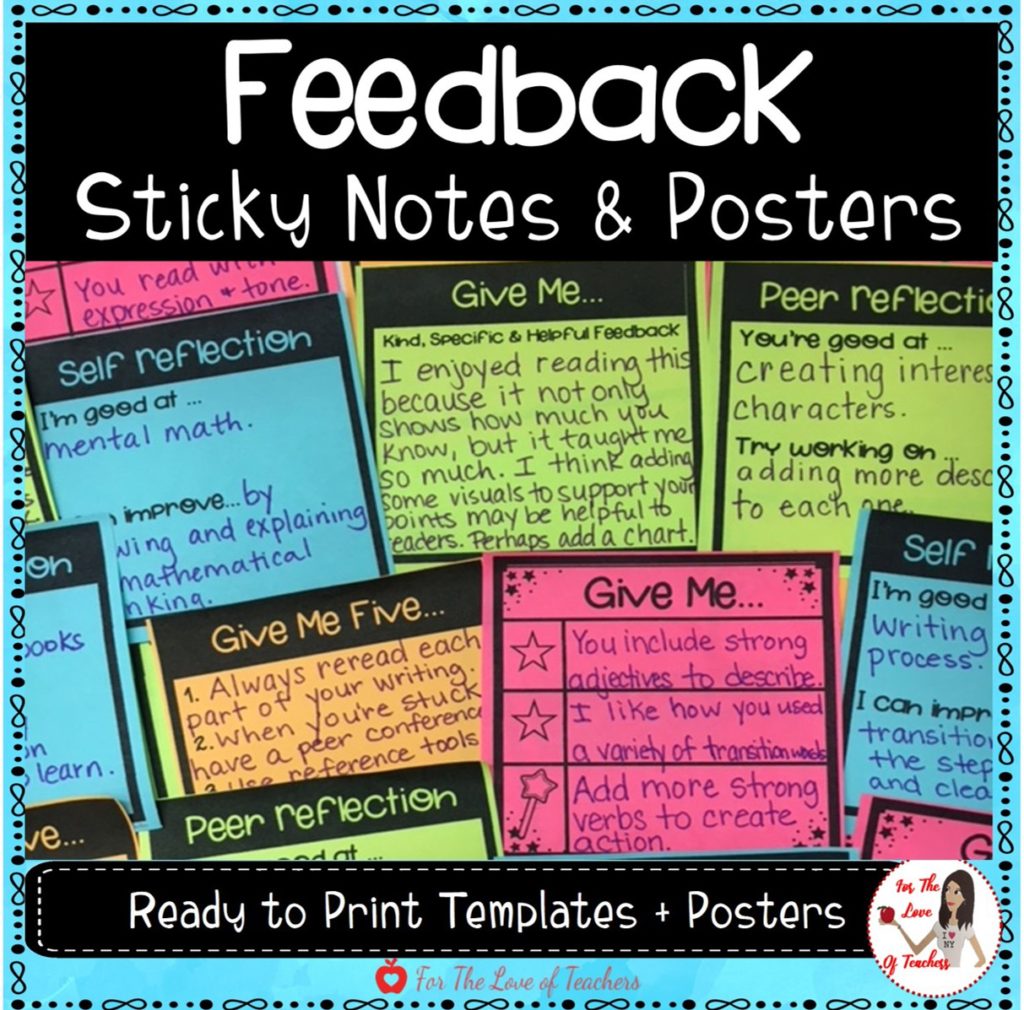
These feedback sticky notes and posters are an effective way to encourage feedback between teacher, students, and peers. It keeps peers focused by giving valuable feedback when conferring with each other.
You can check out these Feedback Sticky Notes & Posters here.
Revising By Trait: Checklists, Checklists, Checklists
Revising by trait is helpful for breaking down the revising process into small, focused parts. Sometimes we just need to provide our students with the right tools to become successful with revising. I created poster checklists for a Writer’s Workshop bulletin board or wall space, student reference checklists, and sticky note checklists which are especially helpful for revising with a focus on the six traits and uses the revising equation: +add, -subtract, X change, and /divide. These checklists are easy to use and provide just enough guidance for students to use independently and with peers. Soon enough you’ll see that your students will not only become experts at revising but at mastering the six traits of writing as well.
Take a look: Revising Checklist Posters & Sticky Notes: Six Traits of Writing
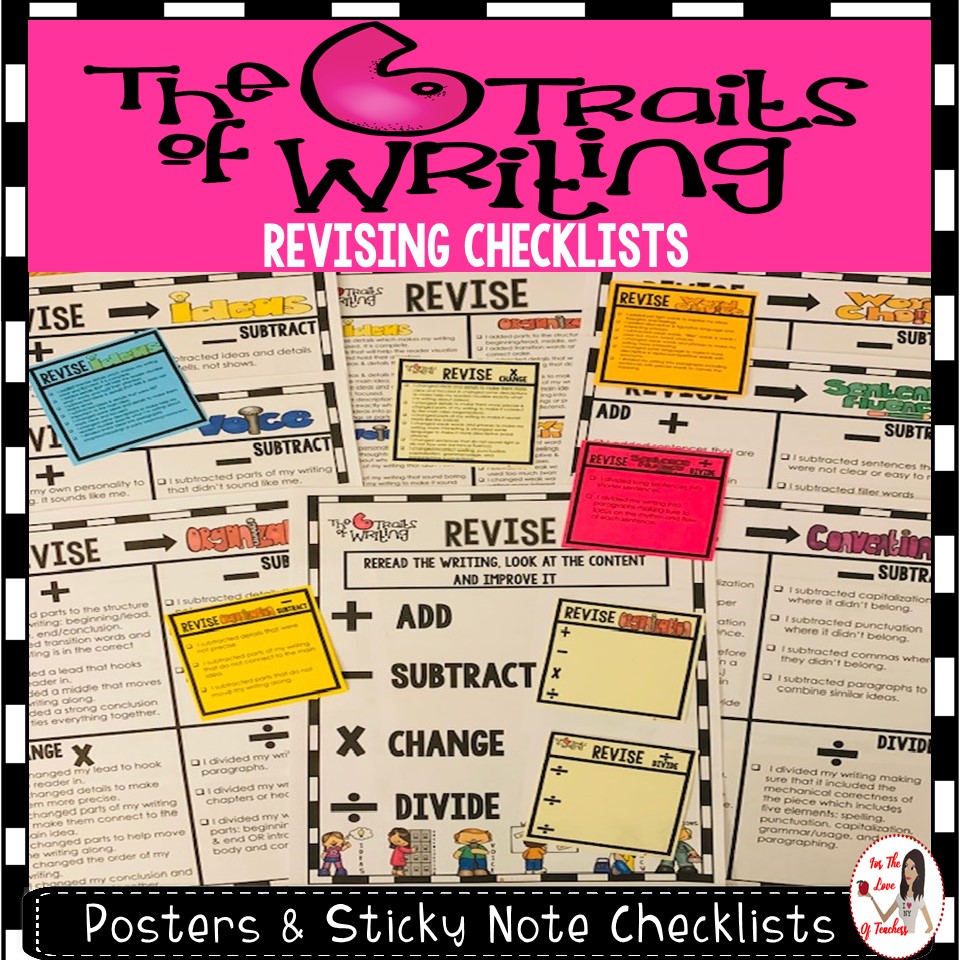
Just the sticky notes –Revising Sticky Note Checklists: Six Traits of Writing
Just the checklists: Revising Checklists: Six Traits of Writing
Practice Makes Better
Students need a lot of guidance and practice with revising as they confer with their teacher and peers. Getting students comfortable with this process is really important in actually improving their writing. There’s no race getting to publishing. Be clear with the expectations and deadlines to complete the writing but be sure to allow students to work at their own pace. The more time students spend on revising and conferring to receive meaningful feedback the more students will be successful at improving their writing. You’ll also see a lot of growth and progress as your students begin to think and write like writers as they develop into writers.
Writing Like Writers: Guiding Elementary Children Through a Writer’s Workshop
This book for sure has made me a better writing teacher. I love that it is a teacher-friendly, easy to use guide for any teacher seeking to build a classroom of writers. There are fantastic mentor text examples to teach each writing trait, skill or strategy that engages students and helps them develop into writers throughout the writing process. This book is a must-have for all teachers with tons of reproducibles too. My students and I even named our class writer’s workshop, Writing Like Writers, after this book. It’s definitely a must-have!
How do you coach your students through the revising process to develop them into writers? Share in the comments.
Follow me to be notified when new resources are uploaded to the Shop and join the email list to receive the latest and greatest updates, posts, and some awesome freebies!
If you like it, then pin it,
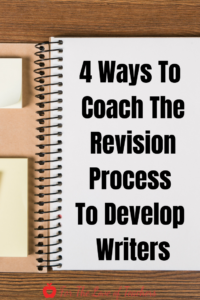
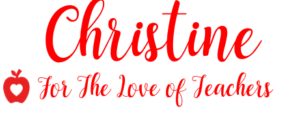
Oh, by the way, if you need help organizing and managing Writer’s Workshop in your classroom, check out my Boot Camp Mini-Course to get you started.

Christine Weis is a passionate educator, classroom management coach, wife, and mom of two busy boys. She enjoys teaching, writing, and creating resources for teachers.
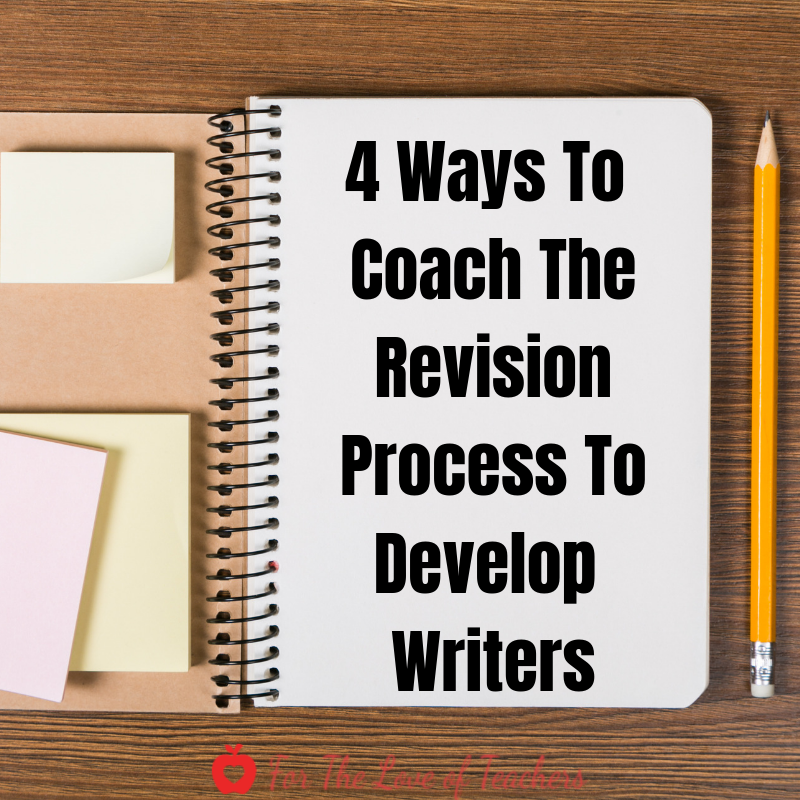
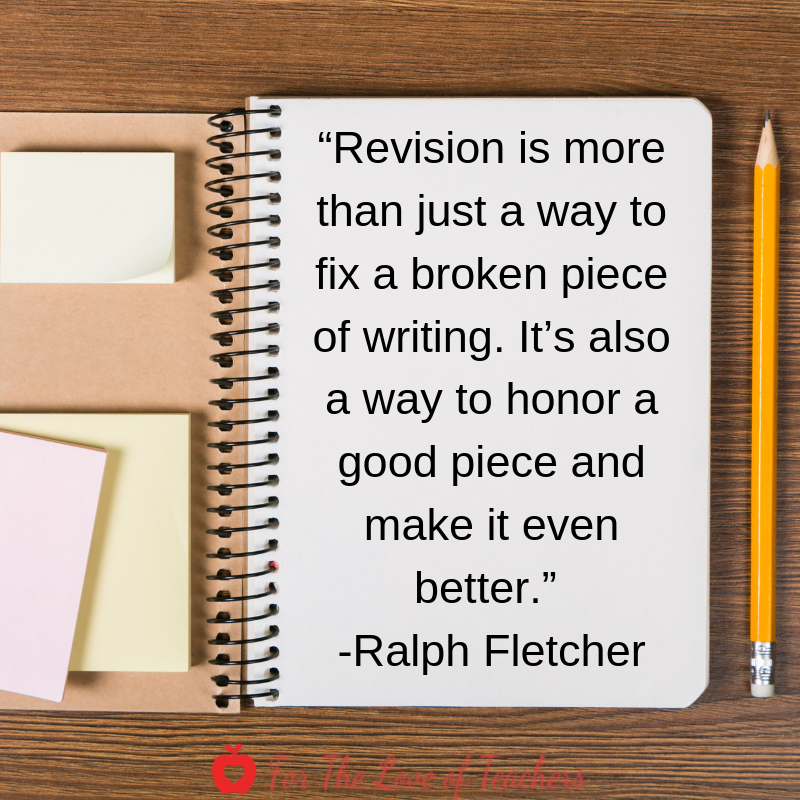
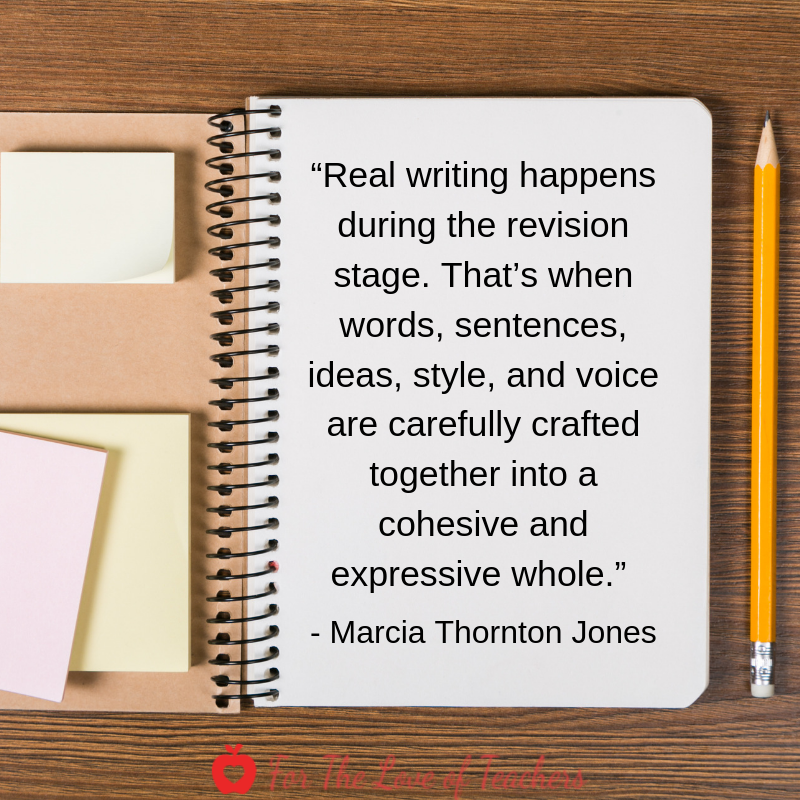

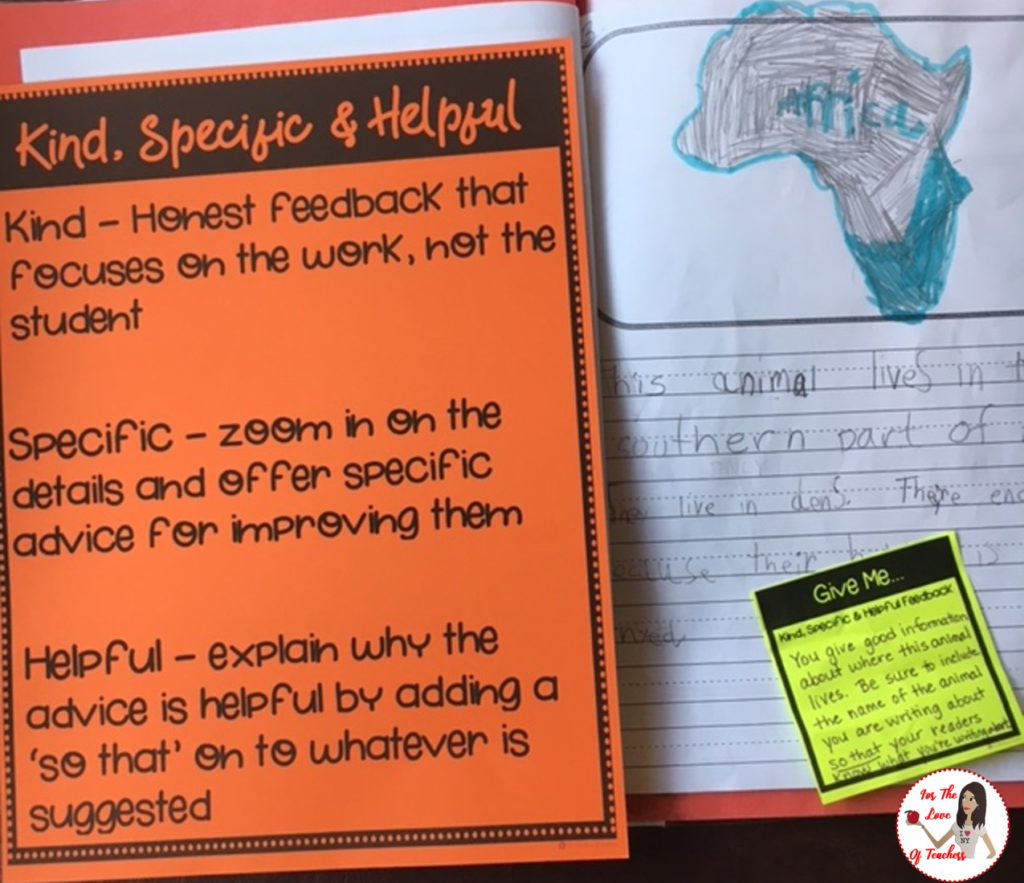




Making sure that you do this step is so important! I love that you have mentioned that it is so critical in the process.
Revising takes a long time and requires a lot of reflection. Most writers find this to be a very tedious task but it is a critical part of the process and must be done. Thanks for reading!
Christine at For The Love of Teachers
Sticky notes do come in handy. A friend of mine was the first to show me its potential.
Sticky notes are LIFE! I use sticky notes for just about anything and everything! I’m glad you use them too! Thanks for reading!
Christine at For The Love of Teachers
I always believe in constructive criticisms especially on writing. I always ensure that I listen and check my work from time to time especially inputs from the experts. Practice makes perfect!
I find that taking time away from the writing piece and working with peers really helps to improve the writing. It may not be perfect but it certainly will be better. 😉 Thanks for reading!
Christine at For The Love of Teachers
I always believe in constructive criticisms especially on writing. I always ensure that I listen and check my work from time to time especially inputs from the experts. Practice makes perfect!
I always believe in constructive criticisms especially on writing. I always ensure that I listen and check my work from time to time especially inputs from the experts. Practice makes perfect!
I’m always looking for ways to improve my writing. This is really, really awesome. Love it,thanks for sharing.
I’m so glad! Writing tips pertain to all writers. 🙂 Thanks for reading!
Christine at For The Love of Teachers
Love this different approach to writing! I always felt like people never really put a lot of substanial effort into revisions!
Good Point! Revising is often overlooked or not put enough effort into it. It takes time! That’s why it is part of the writing process, right? Thanks for reading!
Christine at For The Love of Teachers
It’s all about practice and I love the idea of sticky notes advice! I work with my friend on our writing and we really elevate each other’s work!
It really is all about practice. Sticky notes are life! LOL! We use sticky notes for everything!!! Peer conferring is both valuable and meaningful. Students LOVE conferring with peers. Thanks for reading!
Christine at For The Love of Teachers
I’m not really good at writing and was never interested before but now that I think of it, it’s a good skill that pretty much everyone should really be good at. :0)
Yes, absolutely. Writing is thinking and communication. Perhaps it’s something that you can work on! 😉 Thanks for reading!
Christine at For The Love of Teachers
This technique would work both for children and adults to improve their writing. I will have to check out that book. It looks like it will help me a lot.
Exactly! These tips and strategies all to all writers at any age. I LOVE that book. Another great book is Be a Better Writer by Steve Peha. It’s applicable to all writers.
I learned something new today from this post- the Ralph Fletcher’s clever equation for revision. Definitely gonna help me out too! 🙂
Excellent! I’m so glad. This revising equation is helpful for all writers of any age. It helps me to be a better writer too. Thanks for reading!
Christine at For The Love of Teachers
Great advice! Practice really does make perfect! And advice from your peers can be invaluable ^^. Thanks for sharing!
Thank you! Peer conferring is really important and meaningful to students. Thanks for reading!
Christine at For The Love of Teachers
Knowing how to revise one’s own work is super important because we don’t always have access to an editor or a teacher. This is great.
I agree! Revising is so hard and usually overlooked or rushed through. Thanks for reading!
Christine at For The Love of Teachers